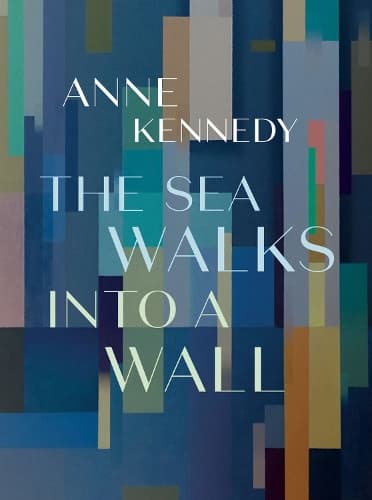Review: The Sea Walks into a Wall
Reviewed by Harry Ricketts
I’m a great admirer of Anne Kennedy’s first two collections, Sing-song (2003) and The Time of the Giants (2005). The first, based on a mother’s desperate attempts to find a cure for her child’s acute eczema, cleverly and movingly collides public institutions and private feeling; the second, imagining a family of giants, more fantastically but just as viscerally explores relationships, prejudices and a deep sense of otherness. Neither The Darling North (2012) nor Moth Hour (2019), both much acclaimed, quite got under my skin in the same way.
Her new collection, The Sea Walks into a Walk, like her earlier work, shows Kennedy continually adroit with form, few of the poems repeating the same pattern or arrangement on the page. There are poems in couplets (long and short); poems with enormously extended, prosy lines; mantralike poems hammering a phrase (“The person of the hour …” in An Hour) or a word (fall, fell, falling in What Fell). Warp and Aho: A Part-life in Flax imitates the shape and process of Māori weaving techniques.
There’s a wide tonal range from the playful to the satirical to the heart-turning. Kennedy likes to slip in literary echoes and references: here we are nudged by Shakespeare, Joyce, Lessing, Rhys, Duras, Tennyson, Dante, Forster, Eliot (T.S.), Sendak and Heaney, among others. Some of the more lyrical poems include flicks of internal and end-rhyme. Lines jump out, lodge in the head: “Love fills the room like a maze;” “The painting charges into his life like a horse, a little scary and exciting like sex.” Kennedy is a literary poet but not in a showing-off way; it’s just how her imagination works.
Others will form their own favourites, but mine are definitely the title and concluding sequences, The Sea Walks into a Wall and Sea Wall Canticle. I warm to the voice, to the sinewy twists of thought, the return of a key line (“You go down there and you”), the bursts of feeling, the way the sequences find solutions to the puzzle of how to be personal without sounding self-regarding or (that now dirty word) confessional.
The poems are linked, as their titles suggest, by the image of the sea wall. This is the Island Bay sea wall in Wellington where Kennedy grew up: “All summer, children ran along the wall;” “the steampunk wall / waits for the sea.” It is also an adjustable metaphor whose permutations include the Pākehā past (“I am a daughter of the wall. It’s my / post-industrial wall and I stand by it;” “You go down there and you // learn the time before the wall”) and a past whose barrier, rupture and legacy allows Kennedy to align herself with particular women writers: “At home in Island Bay, I read Duras, I read Jean Rhys, / Doris Lessing, all the fucked-up settler girls.” (The title of Marguerite Duras’s searing 1950 novel Un barrage contre le Pacifique, set in French Indochina, was translated into English as The Sea Wall.) The Sea Walks into the Wall is both the splintered diary of another “fucked-up settler girl” and a meditation on origins and consequences: “My heart is like a wall / struck down in a storm. / You didn’t even need that wall / at all.”
Sea Wall Canticle is more straightforward. It is a gappy, affectionate elegy for Claire Brookes. She was a brilliant singer who could have studied in London and probably have had an international career as dazzling as Kiri Te Kanawa’s. Instead, she opted for marriage and motherhood in Island Bay, where Kennedy became a kind of surrogate daughter: “I … snuggled in next to Helen / and stayed for the rest of my childhood.” Elegies are among the hardest poems to write; Sea Wall Canticle offers a master class in one way to do it: full of crisp detail, and, like the collection as a whole, underscored with heart.
Reviewed by Harry Ricketts
